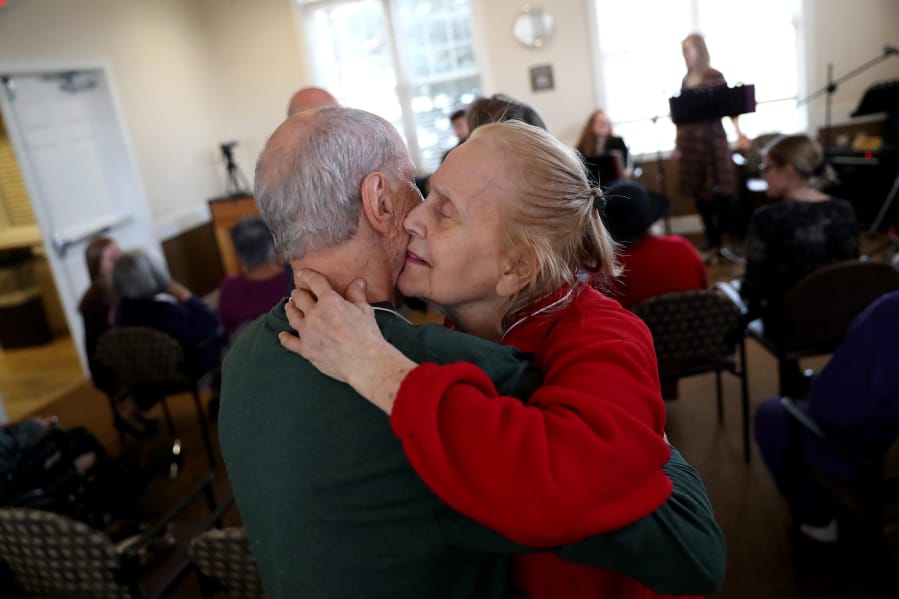An audience of patients with Alzheimer’s disease listens in rapt attention as a young woman sings the French song “Beau Soir.” Despite his failing mind, one of the men in the crowd, Les Dean, translates the words into English for a friend.
“See how the setting sun paints a river with roses,” he whispers. “Tremulous vision floats over fields of grain.”
And when the audience joins in a singalong on another tune, Dean’s voice rumbles in a resonant baritone, “Take my hand, I’m a stranger in paradise. All lost in a wonderland, a stranger in paradise.”
Dean, 76, once taught music at Chicago’s Senn High School, invented and sold his own music education system and sang with the Chicago Symphony Chorus. Now, like many patients with Alzheimer’s, he is to some extent lost in the past, a stranger to the present. But when the music plays, he smiles, and is transported to a place of beauty, where everything still makes sense.
In recent years, music therapy has grown in popularity for its seeming ability to help calm people with dementia and reconnect them with their memories. Now a Northwestern University researcher is testing whether music played for residents of a suburban nursing home can improve cognition, conversation and relationships.
As the number of dementia patients grows — to nearly one in three seniors by the time of death — advocates hope to get insurance and Medicare to extend music therapy to everyone who could benefit.
In the process, caregivers whose parents or partners have grown distant, confused and agitated are finding new ways to share meaningful moments with the ones they love.
Research has suggested benefits from music therapy for people with autism, depression, schizophrenia, brain injuries and cancer.
For people recovering from a stroke, the rhythm of music can help them regain their gait. Those with aphasia, who’ve lost the ability to speak, sometimes can sing familiar songs, and some can eventually be taught to transition from singing to talking.
Such therapy, known as melodic intonation treatment, was used to help Arizona congresswoman Gabrielle Giffords recover her speech after she was shot in the head.
Researchers suspect this may be particularly useful for patients with damage to the left side of the brain, because music emphasizes use of the right side of the brain, providing a potential alternate route to develop new nerve pathways.
For some with dementia, music therapy has been shown to enhance attention and cognition, to improve behavior while reducing the use of psychoactive drugs, and to reduce anxiety and depression. Singing songs can help prompt specific memories that otherwise might have been forgotten completely, experts say.
And because music is also processed in part in a core part of the brain called the cerebellum, doctors say patients can retain the ability to dance and sing long after ability to talk has diminished.
Some patients get very agitated by being disoriented, and might throw things or lash out at others. But when they hear music from their youth, it can put them in a familiar environment and help them feel more at ease. On the other end of the spectrum, some patients are so nonresponsive or heavily medicated, they may need music to wake them up and get them moving.
Intrigued by the potantial benefits, Dr. Borna Bonakdarpour, a neurologist with Northwestern University’s Feinberg School of Medicine, put together a music therapy study this spring at Silverado Orchard Park Memory Care Community in Morton Grove.
Each week for 12 weeks, the Evanston-based nonprofit Institute for Therapy Through the Arts held concerts for 10 Silverado residents. The musicians are specially trained to apply their skills to therapy, often by interacting with patients during performances, and getting them to beat on drums, sing and dance. The $84,000 program was funded by an anonymous donor.
A similar group of residents in another nursing home went without the therapy to compare results. Since finishing the initial study period in April, researchers are analyzing the results, and hope to try the same treatment for the opposite group in the future.
“Music therapy is gaining more confidence now as an intervention, so this is a very exciting time,” Bonakdarpour said. “We thought when people get Alzheimer’s, they’re done, because there’s no medicine to cure it. But there’s so much we can do to have an impact and improve their quality of life.”
One music therapy program, Songs by Heart, boasts locations in several states. It was started in 2015 by Evanston native Nancy Gustafson, a soprano who has performed in Europe’s major opera houses with Luciano Pavarotti and Georg Solti.
Gustafson’s mother had dementia and couldn’t speak with or recognize her daughter. But when Gustafson played piano and sang for her, she says, her mother began singing along and talking, to her daughter’s amazement.
At Silverado, before the concert began, some of the residents were subdued, showing little emotion, not saying much. The ensemble — a pianist, cellist, singer and percussionist — began to play. There were some classic instrumentals, like a piano-cello duet of “The Swan,” and some crowd-pleasing singalongs, like “Get Happy.” The group previously played “Over the Rainbow,” but found that was too emotional for some of the residents.
Many in the audience followed the tempo with tambourines, small drums or hand claps. Some got up and danced.
After the concerts at the nursing home, the residents broke into smaller groups to share their thoughts. When asked what he did for a living, Dean didn’t answer that he was a retired music teacher, but simply said, “I’m a music teacher.”



